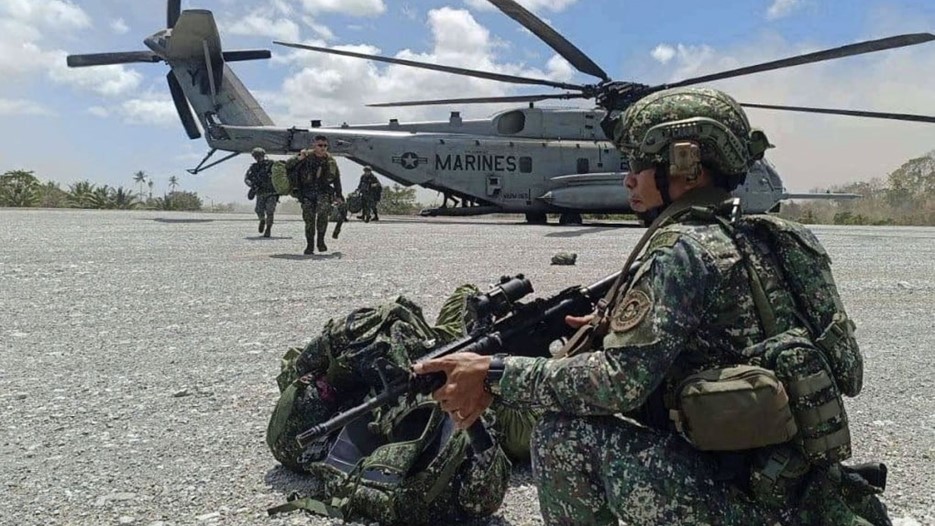When Joe Biden, a key architect of the Obama administration’s “Asia Pivot” policy, became the US president in 2020 and introduced his Indo-Pacific Strategy in February 2022, his apparent objective was to make the region more “peaceful” and manage its seas according to accepted international “rules”.

Biden’s Pacific Dream
“The passage of time has underscored the strategic necessity of the United States’ consistent role” in the Indo-Pacific region, says Biden’s Indo-Pacific strategy document. How this so-called necessity was established and how the so-called consistent role was imagined is irrelevant today insofar as we do see some form of permanence taking root. This is most clearly evident from the recent reports in the Western media indicating the permanent deployment of the US Typhoon Missile system in the Philippines.
The missile system was brought to the Philippines earlier this year as part of joint exercises. Now that Washington is citing “tensions with China” to justify a permanent deployment of this system, make it crystal clear that the former never intended to take it back, since “tensions” with China are nothing new. Had the US indicated earlier its actual intentions, it would have drawn a very strong response from Beijing. But Washington’s strategy was to present Beijing with a fait accompli. Washington preferred deceit to strategic clarity to establish Biden’s dream: a consistent (read: permanent) role in the region.
Biden’s other treaties, such as AUKUS and the trilateral strategic pact with Japan and South Korea, also stand to reinforce the sense of permanent presence. Even though Washington does not have a clear advantage over China in the region in terms of the latter’s depth of economic ties with regional countries, there is little denying that the US has been able to push itself militarily in the region. This is a limitation as well as an advantage.
Who/What Washington is Targeting
It is China for several reasons. But it is not only China for other reasons. The purpose of this “permanent” presence and military deployment is to remind many other countries in the region of Washington’s global dominance. This reminder is necessary because this dominance is highly questionable now, with several countries in Asia not taking US dictates seriously. This is most clearly evident from, for instance, the continuous flow of Russian oil, despite US sanctions and threats, to countries in Asia. While the immediate exporters are China and India, Russian oil and related petroleum products are also travelling elsewhere. India, for instance, has been earning millions of dollars not only by purchasing discounted Russian oil but also by exporting it to Europe. In 2023, India imported 34 per cent of its oil from Russia. In the same year, it imported roughly 225,000 barrels per day (b/d) of petrol and diesel products, up from an average of 120,000 b/d in the previous five years, according to the International Energy Agency (IEA). Clearly, Washington is unable to force its QUAD ally to change its behaviour towards Russia. Fearing that other countries in the region might follow the “Indian model”, it needs to deter them. A good way of deterring them is to increase the military footprint in the region, indicating Wahington’s so-called indispensability to the region’s security and the necessity of not annoying it.
Russia matters also because it has recently begun to extend support to China in Southeast Asia. Russia was invited to attend the three-day meeting of the 10-member Association of Southeast Asian Nations (ASEAN) bloc in the Laos capital of Vientiane in July 2024. In this meeting, Chinese and Russian foreign ministers met their Southeast Asian counterparts after vowing to counter “extra-regional forces” (read: Washington). More importantly, they announced their joint resolution only a day before Antony Blinken arrived in the region. Russia’s support for China – which might be tied to Chinese support for Russia against the combined forces of the US/NATO and Ukraine – naturally meant that Washington needed to up the ante; hence, the decision to permanently deploy the missile system in the Philippines.
The AUKUS alliance is pouring billions of USD. The UK pledged US$5.3 billion, the US is contributing US$17.5 billion, and Australia has committed more US$20.7 billion. The amount of money being spent is not only due to the nuclear aspect of the treaty but also the more worrisome possibility of a more direct Russian-Chinese alliance in the Pacific that, without this treaty, might easily outgun and outpace Washington’s interests.
Does “Asia Pivot” Live on?
To the extent that Biden’s dream included a permanent “pivot” to Asia, there is little denying that he has been able to put in place structures that might remain relevant in the years to come. Because his legacy critically lacks an economic component – which many countries in the region consider very important – the actual success of Washington will be determined not simply on the basis of the military hardware it can put in the region but also on the basis of the ways, and whether or not, it can offer itself as alternative force partnering in the region’s economic development. More importantly, even if Washington is unable to offer any concrete economic plan, the mere deployment of military hardware can run into problems. For instance, even if the Typhoon system is placed in the Philippines, its usefulness can quickly change in the event of the current pro-US president losing elections and/or a pro-China leadership capturing power. Does Biden’s legacy leave with a mechanism to manage such a crisis? Apparently, No.
Salman Rafi Sheikh, research analyst of International Relations and Pakistan’s foreign and domestic affairs, exclusively for the online magazine “New Eastern Outlook”
